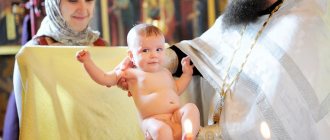What should a godmother do when baptizing a child in church? Godmother
Before agreeing to baptize a child, a woman must accept the great responsibility placed on her shoulders. It is important to understand what it means to be a godfather, and not to superficially follow the traditions of Orthodoxy. It is imperative to choose a suitable candidate with faith in your heart and full responsibility. This could be a relative or friend, not necessarily married, but a believer and an exemplary one. If she is not baptized, it is important to be baptized before the fateful day for the baby and be sure to receive communion.
Responsibilities of a Godmother
You should not conduct an interview or casting for the role of second parents. You just need to draw a conclusion about the attitude of the applicants towards God, the people around them and all living things. If the baby’s mother thinks that godparents should only buy a cross and a kryzhma, and then participate in the church sacrament, and that’s where participation in the fate of the new person ends, then she is very mistaken. Spiritual education and development of a child is what a godmother should be able to do throughout her life. In this case we are talking about the following responsibilities of godparents:
- Be with the child all the time, help in difficult situations.
- Teach prayers and simply talk about God, his role in the life of every person, and attend church together.
- Every year, congratulate you on your birthday and give gifts on Angel’s Day.
- Take communion regularly, involve your godson/goddaughter in the ritual.
How many times can you be a godfather?
Every Orthodox person can take part in this church rite, an unlimited number of times, if the child’s parents request it. A truthful and informed decision is welcome. Another important question that worries us before the sacrament is who can be godparents, according to church scripture? All believing relatives and friends can take on responsibilities, for example, an older brother, sister, girlfriend, friend, grandfather, grandmother, even stepfather. Cannot be godparents:
- non-believers;
- church ministers;
- people of other faiths;
- unbaptized;
- mentally unstable people;
- biological parents.
Church opinion
Sometimes it happens that parents find out about the wrong choice directly in church on the day of the sacrament.
You are not supposed to be godparents:
- biological mother and father;
- minor girls under 14 years old and boys under 15 years old, as they are still looking for their own path;
- a married (civil or official) man and woman, as well as the future single godmother and father chosen, are not allowed to marry each other;
- adoptive parents, guardians, stepfather and stepmother;
- taboos are imposed on atheists, people of other religions, nuns/monks;
- people with any mental disorders.
The godmother is unmarried. Superstitions in our life
1. There is a belief that if unmarried people baptize their first girl, they will give her their feminine happiness and will never get married.
We are civilized people - this is a prejudice. It doesn’t matter what mom’s position in society is. The most important thing is that she understands the full magnitude of responsibility for the child entrusted to her.
2. In addition, only a married woman should be chosen as a mother for a girl. Otherwise, the girl will wear a kind of “crown of celibacy.”
3. After the ceremony, are godmothers and fathers not allowed to marry each other? This sign grew into a saying: “Godfather and godfather are like brother and sister.”
Here it is important to understand that the Holy Church really prohibits marriages: a) godfather and goddaughter, b) godmother and godson, c) godparents and natural parents of the child.
But the marriage of godparents is not directly prohibited. Catholics, for example, are quite loyal to such marriages. Like the Orthodox Christians themselves, in their understanding there is nothing wrong if lovers decided to get married, but before that they became godparents. This is only for the baby's hand. Judge for yourself, if the godparents are family, then it will be much easier for them to participate in the child’s life.
3. Godparents must be of the same religion into which the child is being baptized.
The Orthodox strongly insist that both parents be Orthodox. Godparents are teachers of faith, and if their faith is different from the child’s faith, then contradictions are inevitable.
4. They must be prepared for the child’s baptism.
In Orthodoxy, everything is much more demanding; godparents must undergo a series of interviews with the priest, as well as confess, take communion, and devote all the time remaining before the christening to prayers.
5. All sins committed by a child leave an imprint on the godparents.
The opinion of Catholics on this question: “listen, the church is not a nuclear power plant, and baptism is not a ritual of a chain reaction.” Man is an individuality both for man and for God.
Why do atheists agree to baptize children?
This question has been bothering me for a very long time. Why do we take unbelieving close relatives as godparents to our children? They are already aunts and uncles. What will change from their new status? Will they become closer to the children? Not at all... Is the meaning of baptism for many only in the “act” of baptism itself, when everyone with stony faces watches a process they do not understand and listens to incomprehensible chants?
I'll tell you my story very briefly.
My mother’s family includes 3 children with her (+2 brothers). So, back in 1989. (not immediately after birth) I was baptized as a godmother and godfather should be. My father at that time was a Baptist (but again an unbelieving Baptist), but his cousin agreed to become my godmother. My uncle, my mother’s brother, became my godfather. Atheistic views, believed in science and education, but was baptized in childhood by my grandmother. My godmother disappeared after two chocolates a year later. My godfather spent my entire childhood with me. At first I called him “Vova”, then we switched to the short “Cre”.
Our relationship evolved once - in 2000. In the summer we caught butterflies, swam in the river, baked potatoes in a fire, played badbinton, walked kilometers off-road, wove wreaths from dandelions and lay in a field with strawberries. In winter, we walked in the Botanical Garden, in the village they built slides with ramps, he took me on a sled, and rode the same sled himself. We went skiing and skating and both got hit in the neck by my mother when we came home up to our ears in icicles. By the way, he has no children. He has never been married.
Was he my godfather? Only in words. He was an uncle, the best. He was my friend! He was the person who constantly gave me gifts, the kind that my parents didn’t buy for me. But I did not receive any spiritual education. He explained what is good and what is bad. His example was enormously positive, to say the least. He had a positive influence on me emotionally. Amazing man.
But in 2000 everything turned upside down. After the tragic death of his brother (my second uncle), my godfather became isolated. The three of them (mother + 2 brothers) had an amazing bond. The unjust death of a diplomat against the backdrop of the beginning war in Iraq - and everything went awry. Broken. He left me, it seemed to me that I had lost him. Within half a year he went into religion. In 2003, everything began to improve - he found himself in religion, accepted death as a given. Priorities have changed, our relationship has moved to a new level. (By the way, my father received holy baptism, too) And I found my godfather again. I haven't lost a friend. We also baked potatoes and rode bicycles in the summer, had heart-to-heart conversations, etc. But now something more began to connect us. Correct literature, religious conversations, stories about his coming. I shared my emotional experiences with him. He always supported me. And he continues to do so.
So, are we doing the right thing when our children are baptized by unbelieving relatives? After all, not everyone comes to religion. That is the question! Why do we think that a child should have two godparents and desperately select a suitable match, knowing that nothing will happen? will not work?
What do godparents buy for a child's christening? What does a godfather give at a christening?
The godfather always gives the most important attribute of the entire baptism ceremony - a pectoral cross. There are no clear rules about what material a cross should be made of. Now in fashion, so to speak, are gold, openwork crosses, decorated with stones and enamel. However, it is not at all necessary to buy such a cross, especially if this is difficult for you for obvious financial reasons.
The main value of the cross is not its monetary value. The cross, first of all, is a symbol of spirituality and faith in God, and not an ordinary piece of jewelry, as many people now perceive it. Therefore, from the point of view of the Church, a simple tin cross made by monks in an Orthodox monastery, or a sandalwood cross brought by pilgrims from a trip to the Holy Land, is much more valuable than any gold. A pectoral cross can also be made of bronze, amber or silver - the main thing is that it corresponds to the Orthodox canon and is consecrated in the church.
Most often in Rus' it is customary to wear an eight-pointed cross with the inscription “Save and Preserve” written on its back side. For a small child, it would be best to buy a silver cross and hang it on a strong natural twine, and not on a chain, which will rub the child’s delicate neck. And if you don’t want to be known as a miser and can afford it, in addition to a silver pectoral cross, give your godson some gold jewelry that will be useful to him when he grows up.
In addition to these gifts, the godfather traditionally pays for the baptismal ceremony and sets the festive table.
What godparents should not do before baptism. Everything you need to know about baptism part 2
1. In what cases is it impossible to baptize a child (they can refuse)?
The child does not have his own religious faith. Therefore, the baptism of an infant is performed exclusively BY THE FAITH OF THE RECEIPT (godparents). A person who does not accept the Divinity of Christ and does not believe in the Holy Trinity, who denies the truths of the Orthodox faith and is generally far from the Church (he has never repented or received communion in his life), a heterodox Christian and a non-Christian, an adherent of occult views, definitely cannot be a recipient. Accordingly, if just such a person is proposed as a recipient, the baby’s baptism will be legally denied until the parents select a more worthy candidate. The appearance of the godparents also matters. It is indecent to enter the temple in sportswear, shorts, and for women even with their heads uncovered. The state of monthly purification of the godmother or mother can also postpone the date of baptism desired by the parents for some time.
2. How should godparents prepare for the sacrament?
On the eve of the date of baptism, godparents should fast, and then confess, clear their conscience in the sacrament of holy repentance, and partake of the Holy Mysteries of Christ. It is advisable to know by heart the “Our Father” and the “Creed”, which the godparents will have to read aloud.
3. Where should parents be during baptism?
If conditions in the temple baptismal facility allow, in principle, nothing prevents parents from being present at the baptism of their child. Of course, the godparents accept the child from the font (the boy is the godfather, the girl is the godmother), and they also hold the child in their arms. At this time, parents stand aside and, as a rule, are busy preparing various baptismal items: shirts, towels... If the child is baptized before the 40th day, the mother cannot be present at the baptism. This is due to the fact that during this period the woman is in physiological impurity. If more than 40 days have passed since the birth of the baby, then the mother even needs to enter the temple, since a special prayer is supposed to be read over her to the woman in labor.
4. Is it possible to baptize a child if he is sick on the day of baptism?
It depends on the disease. If there is a threat to life, then baptism must certainly take place as soon as possible. There is an opportunity to bring a priest to the hospital - wonderful. If for some reason this is not possible, any layman who does not have holy orders (including a woman) can independently baptize a child three times according to the formula: “The servant of God (or the servant of God) is baptized by name, in the name of the Father, amen - first immersion And the Son, Amen - the second immersion. And the Holy Spirit, amen – third immersion.” By the way, every Orthodox person should know this formula: you never know what happens in life. Baptism is performed by three times immersion in water or even sprinkling (the water can be either holy or ordinary - if there is no holy water). If the child survives, the priest will subsequently make up for everything that is missing.
If the disease is not fatal, then why torture both yourself and the child? Reschedule your baptism to another time. Nothing bad will happen!
5. How long does the sacrament last?
It depends on a number of factors: how many people are being baptized, how fast and energetic the priest is... As a rule, baptism takes from 40 minutes. up to 1 hour.
6. What should you take to church?
A pectoral cross, a baptismal shirt (in many churches you can now purchase special baptismal sets intended for performing the Sacrament of Baptism), a towel and a blanket. Birth certificate.
7. Should a child be fed before baptism? eat it yourself?
As for the baby, of course he needs to be fed. For godparents, if baptism is performed in the morning, it is better to refuse to eat at all, and on the day of communion. If baptism takes place in the afternoon, it will be pious to eat fast food on this day. However, the main thing is the serious attitude towards the sacrament and the prayerful attitude of its participants.
8. How are older children (5-6 years old) baptized (with immersion or not)?
Definitely and only with immersion.
9. Is it really better to baptize premature or sick babies as early as possible?
Yes, as early as possible, so that the child quickly has a protector - his own Guardian Angel. If a child is born unhealthy and there is a threat to his life, then baptism can be performed even a few hours after his birth.
How godparents are chosen
Every Christian has his own patron - a saint. The patron saint is usually found by date of birth. A patron saint is your namesake saint, to whom you can pray as your special helper.
Name day will be the day of remembrance of the saint in whose honor the person is named in Baptism. You can choose your own patron saint if you have not yet been baptized, do not know who you are named after, or are still thinking about what to name your child. Most often, patron saints are chosen by date of birth.
Such saints are also called “our Angels,” but this is not entirely true. “Your Angel” is a Guardian Angel who protects you from the moment of Baptism, a Heavenly being. Every baptized Orthodox Christian has his own Guardian Angel, but we do not know his name. Angels are individuals, but their nature is different from human and animal ones. They are taller and more perfect than humans, although they also have limitations. The angel is usually depicted in ancient clothes - a cloak and chiton with gold edging around the collar and around the wrists, with golden wings.
And a patron saint is a person who lived a holy life on earth and shone in the Kingdom of God for his ascetic or martyrdom.
You can baptize a child in honor of your favorite saint and even in honor of your relative, making any named saint the patron saint of the child. This does not require any special customs. One has only to warn the priest before the Baptism, for example, of Alexander, that the heavenly patron of the child will be the blessed Prince Alexander Nevsky or the Reverend Alexander Svirsky.
You cannot baptize a child in honor of the Lord Jesus Christ and the Blessed Virgin Mary, the Virgin Mary. Their names have long been revered. The names of Mary are given in honor of the martyrs, and Jesus - this is a rare monastic name - in honor of the Old Testament righteous man Joshua.
In addition, you can baptize a person with a name different from the name on the passport. This is necessary when the name you have chosen for your child is not in the calendar - for example, Karina. Therefore, the girl Karina can be baptized with the name Irina.
If you don’t know how to choose a name for a child whom you named not according to the calendar (Orthodox calendar), take a baptized name that is close in sound to yours, for example:
- Lily - Leah;
- Svetozar - Svyatoslav;
- Alice is always Alexandra, because the name of Alice before Baptism in Orthodoxy was borne by the holy queen Alexandra Feodorovna, the wife of the passion-bearer Tsar Nicholas II;
- Vladlen (that’s what our parents and grandfathers were called - if they were not baptized, you can baptize them with a different name) - Vladislav.
Also in the Orthodox Church tradition there are names that sound different when translated. The main and most common example: Svetlana - Photinia. It is important that you and your family write exactly the baptized name in the health notes submitted for the child in the church. This is what will be written in the certificate of Baptism. The child can also be named in honor of the Archangel, one of the seven commanders over the Angelic Host, the Archangels, who, according to the Bible, bring prayers to God and stand close to Him as the military leaders of His Heavenly Army of Angels - - Voivode of the Heavenly King Archangel Michael, Herald of the Kingdom of God Archangel Gabriel, Archangel-Guide Raphael, Archangel-Giver of God's Light Uriel, Archangel-Prayer Selafiel, Archangel-Helper to Workers Yehudiel, Archangel-Minor of the Fallen Jeremiel, Archangel of God's Blessings Barachiel.
What godparents do during baptism. What should godparents do before and after baptism?
The rules of baptism require the presence of godparents, who are selected by the parents in advance and are the main ones after the godson himself at the ceremony of the first sacrament. Before baptism, godparents are required to attend a service in the Church. It is also important to go for a conversation with the priest in order to confirm your knowledge of the Orthodox canons and to understand what kind of responsibility is assigned to spiritual parents. The future godparent must be baptized, because after baptism the godmother or godfather will be responsible for the spiritual development of the child, which means they must be Orthodox believers.
According to Christian tradition, godparents fast three days before the christening, do not drink alcohol and do not engage in intimate relations the day before the ceremony. On the day of baptism, they carry the child to the temple without the help of their parents. Be sure to take your child's birth certificate with you.
The godmother must come to baptism in a dress below the knee with covered shoulders, and the woman must also have her head covered. During baptism, the godfather should also pay attention to the choice of wardrobe - it is unacceptable to come to church in shorts or a T-shirt. During baptism, the priest cuts a small lock of hair from the child’s head as a sign of making a sacrifice to God, then the priest dips the baby three times in a warm font and only after that puts a cross on his body. The action is accompanied by traditional church speech and three Christian prayers. Following the priest, the main prayer of the godfather at baptism - the Symbol of Faith - sounds.
The christenings of girls and boys are essentially no different. The only difference is that the boy’s godfather brings him to the altar; this is not the case for girls and women. At baptism, if there are two godparents, it is recommended that the baby be in the hands of a godfather of the same sex.
Who can NOT be a godfather
Estimated reading time: 2 minutes.
Answered by Archpriest Andrei Romashko, cleric of the Church of the Kazan Icon of the Mother of God in Krasnoobsk, head of the Orthodox teenage club “Kovcheg”, Novosibirsk region:
The godfather or godmother, or, as they are also called, guarantors, successors, are one of the main participants in the Sacrament of Baptism.
In the first centuries of our era, when Christianity was banned, believers gathered for prayer in secret, and no outsider could enter the Christian community without a guarantee. The new man was brought by his friend, a Christian, who testified that the newcomer was not a spy or a traitor, and that he lived with dignity and was truly interested in the teachings of Christ. Hence the first rule - an unbaptized person, or a person who is little acquainted with his future godson, cannot be a godfather. After all, in order to bring someone you need to understand where you are going, and in order to vouch for a person, you need to know him well.
In ancient society, strangers were not allowed into the female half of the house; it is clear that only a woman, a friend or a relative could vouch for a woman, and a man, even a relative, may not even know how she lives and what she does. This is how the second rule arose - a woman cannot have a man as a godfather, and vice versa, a woman cannot be a man’s godmother, she knows him too little.
Later, when Christianity spread so much that the baptism of an adult became a rarity (everyone was baptized in infancy), the tradition of two godfathers, a godfather and a mother, appeared, as if the child’s second parents, but baptismal prayers to this day mention only one, the main godfather , for a boy - a man, for a girl - a woman, but the second godfather actually turns out to be only an assistant.
However, when performing the baptism of a child, the pastors of the Church always reminded: baptism makes the participants in the sacrament spiritual relatives, and relatives, as we know, cannot marry each other. A godfather cannot marry his grown-up goddaughter, nor can he marry the child’s mother. These circumstances should be taken into account when choosing godparents. (Traditionally, in the Russian Orthodox Church, godparents, i.e. godparents of one child, could not enter into marriage. But in December 2017, the Council of Bishops adopted a document stating that godparents of one child can enter into a church marriage with each other friend, but only with the blessing of the ruling bishop in the diocese).
Today, godparents perform another function - assistance in the Christian upbringing of a child, from which another criterion for selection follows: the godparent should not be a person poorly familiar with Christianity, a person too old or too young to really influence the godson and help the parents. And, of course, it is not useful to take as godparents a person whose life is not worth following as an example.
On the screensaver: photo of Nadezhda Tkachenko










